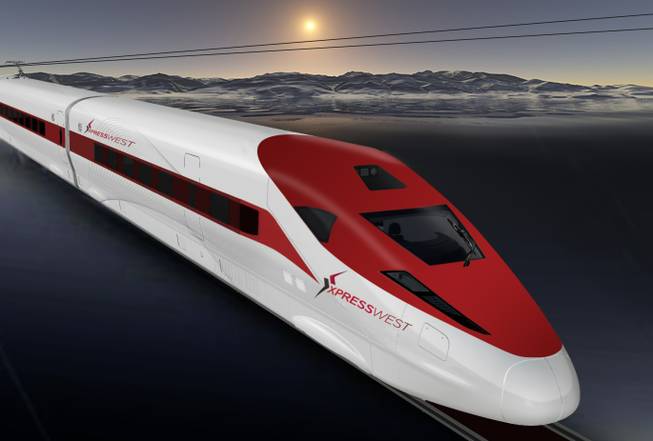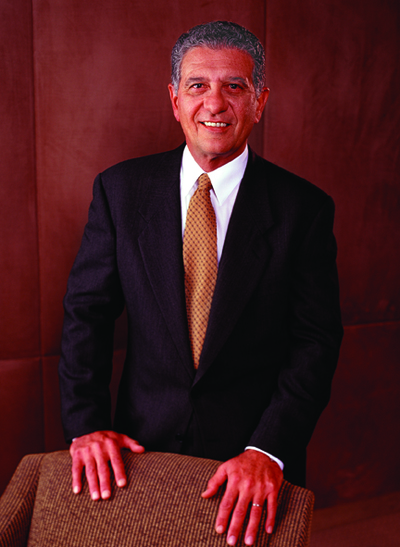
Courtesy of XpressWest
An artist’s rendering of a train on the XpressWest high-speed rail line.
Monday, March 18, 2013 | 2 a.m.
Sun coverage
Things were supposed to be settled by now.
Construction workers were supposed to be digging up corridors, pouring concrete, laying track and otherwise making the country’s first government-endorsed high-speed rail line rise out of the desert between Las Vegas and the Los Angeles exurbs.
On the wings of one project, Southern Nevada’s economy was supposed to be back to work.
But in the years since the XpressWest project (formerly Desert XPress) applied for an industry-backed federal loan to finance the venture, it has run into almost every conceivable political roadblock – and this month, one direct assault.
“The risks to the taxpayer from funding this project are untenable,” Rep. Paul Ryan and Sen. Jeff Sessions, the top-ranking Budget Committee Republicans in their respective chambers, wrote to Transportation Secretary Ray LaHood earlier this month. “We would urge the Administration to reject the XpressWest loan application and to direct its available RRIF funds to more worthy transportation projects.”
It’s the most scathing indictment yet of a project that has suffered from extraordinarily unlucky timing – and the direct attack has at least some of its supporters concerned that the pushback may relegate an already-beleaguered project even further to the back burner.
“I am concerned about it because of the numbers that I’ve seen and the amount of jobs it would create,” said Nevada Sen. Dean Heller, whose staff is speaking to Sen. Majority Leader Harry Reid’s about what could be done to resist the sudden effort to undermine to the project. “It was disappointing that they put that (letter) out there because the funds that are used ... have been funded by the railroad industry for this purpose.”
“It’s more of this Tea Party-driven response,” Reid said. “That is nonsense to hear from the two budget chairs who want to go back to the dark ages on most everything.”
But XpressWest’s main advocates are being cautious about dismissing the bluster from the budget committee Republicans too quickly because they have been down a similar road before.
“At several momentum-gathering points, something appeared, whether it was the election, the (fiscal) cliff, or now the sequester,” said Billy Vassiliadis, lobbyist with R&R Partners, which has been representing the XpressWest venture. “There’s always something that’s a momentum-stopper.”
In theory, lawmakers and lobbyists familiar with ongoing negotiations say the Obama administration is on board with the XpressWest plan.
They are, at present, merely going back and forth about the interest rates and size of the loan. Anthony Marnell, the main force behind the high speed rail venture who has already put up $1.5 billion from private investors, wants an additional $5.5 billion from the Federal Railroad Administration’s Railroad Rehabilitation & Improvement Financing program. The $35 billion federal fund is financed by the railroad industry and has lent money to 33 rail projects since its inception, according to the railroad administration’s website.
The government, meanwhile, is pushing for a somewhat smaller loan, in the $4.5 billion to $5 billion range.
Either way, XpressWest would be the single largest loan disbursed by the program by far. The next-highest loan, made to Amtrak in 2011, was $500 million.
The terms of the loan, which was initially supposed to be awarded in mid-2012, are expected to be settled soon – a fact that partially inspired the letter from Ryan and Sessions.
In light of that letter, however, backers are somewhat concerned that an already-cautious government may become skittish about approving the loan as expected.
“There was anxiety on (the government’s) part, because of Solyndra, and we came out on the heels of that,” said Vassiliadis, who has recently been making near-monthly trips to Washington, D.C., from his base in Las Vegas to meet with railroad administration officials.
Solyndra is a solar cell manufacturing plant that became the unfortunate poster child for the Department of Energy’s renewable energy loan guarantee program when the half-billion-dollar venture went bankrupt. That episode effectively ended the political drive to extend the loan guarantee program, which had backed mostly successful projects, including a hybrid solar power plant in Tonopah.
Critics have voiced Solyndra-esque concerns about the prognosis of XpressWest. Part of the Marnell company’s repayment model for the federal loan is assumption that once the rail line is built, customers will want to buy tickets, estimated at $89 for a round trip. But there are no guarantees.
Questions have also been raised about the viability of the estimated 80,000 jobs that the project would create – enough to knock Nevada’s unemployment rate down by 5 or 6 percent. A study by the Associated Press found that only 722 of the estimated 80,000 jobs would be permanent.
And finally, there is a concern from the government about funding.
XpressWest was initially pitched as a fully self-funded enterprise. But in the post-recession period, backers found there was not as much available private capital for high-speed rail as they had anticipated. That’s why they need the federal loan to meet the $7 billion project cost.
XpressWest officials are certain that once they secure a government loan, they will have the credibility to find more private financiers. The federal government, however, would like to see the rail project pony up more money before it gives the project the green light, Vassiliadis said.
“It’s almost like a chicken and egg,” Vassiliadis said. “If we get the designations, then we can go shop.”
The railroad administration did not return a request for comment.
Nevada lawmakers are maintaining a confident front about XpressWest’s predictions.
“There will be plenty, plenty of traffic,” Heller said. “I’ve driven between L.A. and Las Vegas at times when traffic was pretty heavy. I think it’s something that’s needed.”
“We have such a difficult time getting people back and forth from Southern California to Southern Nevada, and it’s not just to watch the shows in Las Vegas – it’s commerce,” Reid said.
The Nevada delegation has no XpressWest detractors – not even from members whose districts won’t serve as direct hosts for the project.
“I appreciate that this is a government program ... from what I understand, they’re going to be competing for money that’s already there,” said Republican Rep. Mark Amodei, who represents Nevada’s northernmost district. “If they compete successfully for that, then that’s fine with me.”
“Critics armed with partisan math need to get out of the way,” said Democratic Rep. Steven Horsford, whose district covers the swath of the state from North Las Vegas to Amodei’s district. “Neither a senator from Alabama nor a congressman from Wisconsin will derail a Nevada jobs project.”
“There’s no reason we couldn’t actually launch an industry,” Vassiliadis said, further defending XpressWest’s numbers. “There’s all these corridors all over the country ... if we launched the ability to be manufacturers, engineers ... if we can get going, this is an industry.”
But the would-be industry still has to clear a political minefield newly laid by skeptical Republican lawmakers looking for ways to balance the budget – and potentially, to deliver a disappointment to the Senate majority leader, who has repeatedly frustrated their party on fiscal matters.
Considering that, project backers say, the threat is serious enough that the only way to be sure the XpressWest project will prevail is if a higher power helps push the normal process along.
“To go or no go is clearly the decision of someone in the White House,” Vassiliadis said. “I think the president. He would have to do it.”


Join the Discussion:
Check this out for a full explanation of our conversion to the LiveFyre commenting system and instructions on how to sign up for an account.
Full comments policy